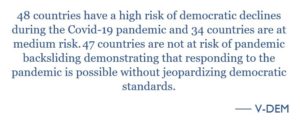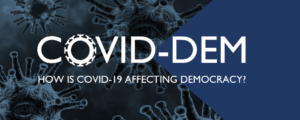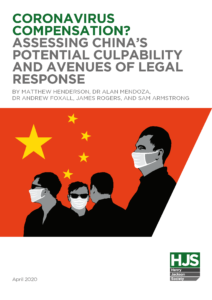An astonishing 71% of Europeans are now in favor of introducing a universal basic income, according to an opinion poll designed by my research team at Oxford University. In Britain, the figure is 68%, says Timothy Garton-Ash.
Less encouraging, at least to anyone who believes in liberal democracy, is another startling finding in the survey: no less than 53% of young Europeans place more confidence in authoritarian states than in democracies to tackle the climate crisis, he writes for the Guardian.

COVID-DEM
This may be a postwar moment, but what if it turns out to be more like the years after the first world war than the post-1945 liberal and social democratic reconstruction? he asks. RTWT
V-Dem (Variety of Democracy)’s Pandemic Backsliding Project aims to track state responses to the Covid-19 pandemic, addressing how these decisions affect short- and long-term prospects for the political regime and democracy, notes COVID-DEM, which adds several project items and resources to its database, including:
- Database: currently contains data on Covid-19 responses by governments in 142 countries.
- Policy Brief: Pandemic Backsliding: Does Covid-19 Put Democracy at Risk?’The project items below have now been added to COVID-DEM:
- DEMOCRACY DIGEST, ‘Democracy’s place in a new post-Covid world order’ (4 May 2020)
- ASEAN INTERGOVERNMENTAL COMMISSION ON HUMAN RIGHTS, ‘Promote and protect human rights while combating Covid-19 pandemic’ (2 May 2020)
- CARNEGIE ENDOWMENT, ‘Can the Coronavirus Heal Polarization?’ (1 May 2020)
- INTERNATIONAL PRESS INSTITUTE, ‘WPFD 2020: COVID-19 accelerating a global decline in media freedom’ (1 May 2020)
 Larry Diamond, Andrea Kendall-Taylor, and Rachel Kleinfeld join Aaron David Miller for a virtual discussion (above) on how the global pandemic will impact different systems of government.
Larry Diamond, Andrea Kendall-Taylor, and Rachel Kleinfeld join Aaron David Miller for a virtual discussion (above) on how the global pandemic will impact different systems of government.
State power in Western democracies is at its most intrusive since the Second World War. For die-hard advocates of free markets and limited government, the abrupt change in direction is horrifying. For others it is less so, even something to be embraced, a harbinger of the future, a turning point that will end up re-reordering their countries, adds VOA’s Jamie Dettmer (below).
 “In times of crisis, checks and balances are often ignored in the name of executive power. The danger is that the temporary can become permanent,” Florian Bieber, a professor of history and politics at the University of Graz in Austria, wrote in a recent op-ed for Foreign Policy.
“In times of crisis, checks and balances are often ignored in the name of executive power. The danger is that the temporary can become permanent,” Florian Bieber, a professor of history and politics at the University of Graz in Austria, wrote in a recent op-ed for Foreign Policy.
The Raoul Wallenberg Centre for Human Rights joined many other civil society groups to sign an international open letter to reveal how the Chinese Communist Party (CCP) enabled the global pandemic by the suppression of information, arrest and disappearances of doctors and dissidents, and a global disinformation campaign. The groups seek to hold the CCP accountable through international tort actions and targeted Magnitsky sanctions against the officials responsible.







